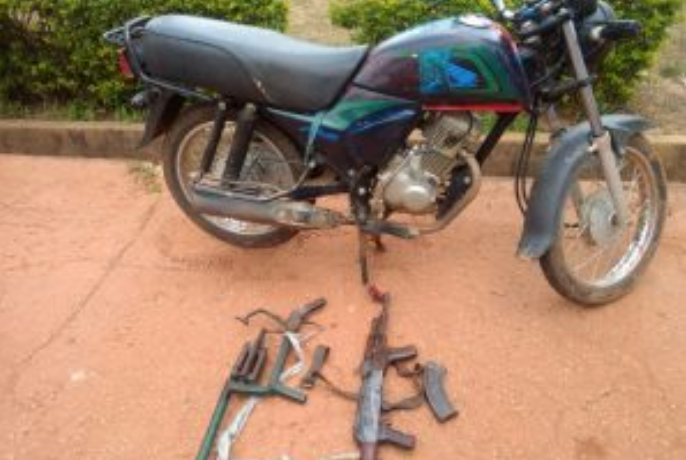Police in Kaduna State have killed one bandit and recovered one AK49 gun and one locally fabricated.
The spokesman, DSP Mohammed Jalige confirmed the incident.
He said the tactical operation followed a distress call that some bandits were sighted on the Galadimawa-Kidandan Road in Giwa Local Government Area of the state.
“Their movement was strongly suspected to be for their usual heinous mission.
“In a bid to truncate such mission police operatives were deployed to the location for a possible engagement and restoration of safety.
“The operatives engaged the hoodlums with clinical precision and succeeded in countering the bandits’ mission as they were compelled to retreat into the forest.
“Some sustained bullet injuries while one was gunned down; his AK49 assault rifle and operational motorcycle were recovered.
“Equally, a locally fabricated long-range revolver with its 12 polymer cased cartridges were recovered when a search was conducted in the area,’’ he added.
Jalige said the command had been making efforts to restore public confidence through rigorous patrol and surveillance to prevent further attacks on communities or on commuters.
He applauded the commitment of the operatives and tasked them to sustain recent gains to ensure safety and security in the state.
In other news ,the Federal Government has called for a safe and healthy working environment and conditions, especially in the informal sector, for the protection of both employees and employers.
Ms Kachollom Daju, Permanent Secretary, Federal Ministry of Labour and Employment, made the call while declaring open the Stakeholders’ Workshop on the validation of action checklist on strengthening the capacity of Micro, Small and Medium Enterprises (MSMEs) in Abuja.
Daju was represented by Director, Occupational Safety and Health in the ministry, Mrs Lauretta Adogu.
The workshop was organised to produce high-quality Personal Protective Equipment (PPE) and Healthcare-related products.
According to her, a safe and healthy workplace will not only provide protection against injury and illness, but also enhance productivity, which will ultimately lead to increased national economic growth.
”The Nigerian economy is grown largely by MSMEs, with about 80 per cent of employments in the informal sector, thus the need to radically improve the nation’s safety and health culture, to minimise work-related accidents and diseases.
”The checklist would assist MSMEs in their response to the COVID-19 pandemic by assessing the risk to the enterprise and ensuring that the workplace is prepared for any future epidemic, ” she said.
Daju said that the Federal Government, the International Labour Organisation (ILO) and other social partners have been working together to strengthen the capacity of MSMEs.
She added that this would as well raise awareness on workplace prevention of COVID-19, and measures to ensure safety and health at work, with particular focus on the production of PPE and healthcare-related products.
The Permanent Secretary urged the stakeholders to employ their professional and technical skills in deliberating on the checklist.
She urged them to bring it in conformity with international best practices, and to help the MSMEs minimise work-related accidents and diseases.
She noted that inputs from the validation meeting of stakeholders would add optimal value to the overall performance of National Occupational Safety and Health Management System in Nigeria.
Earlier, the ILO Country Director, Ms Vanessa Phala, said that the Action Checklist on OSH would support enterprises in building a culture of safety and health at work.
According to her, using illustrations adapted to the Nigerian context, the checklist provides an easy-to-use tool for MSMEs to review their operations in a number of priority areas, including the prevention of COVID-19.
She added that following the negative impact of COVID-19 on MSMEs globally, Nigeria and the United Nations system devised a project aimed at strengthening the capacity of local MSMEs and manufacturers, to produce high quality PPEs and healthcare related products.
She stated that the project had been working with about 174 local MSMEs across the six geopolitical zones in Nigeria, promoting safety and health at work among those and other enterprises.
Stakeholders at the workshop include Nigeria Employers’ Consultative Association (NECA), Nigeria Social Insurance Trust Fund (NSITF), and the Manufacturers Association of Nigeria (MAN).
Others are the Office of the Head of Civil Service of the Federation (OHCSF), Standards Organisation of Nigeria (SON), and the Nigeria Centre for Disease Control (NCDC).

















Discussion about this post